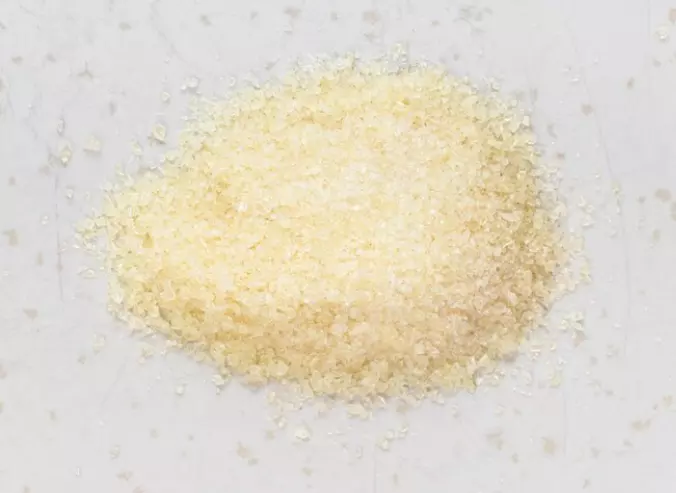IUPAC Name
Gelatine
Cas Number
9000-70-8
HS Code
3503.00.20
Formula
C102H151N31O39
Appearance
White or Yellowish Powder
Common Names
Gelfoam
Packaging
25 kg kraft paper bag, 25 kg woven poly bag
Brief Overview
Gelatin is a mixture of peptide and protein substances derived from collagen, a natural protein in mammals' tendons, ligaments, and tissues. Gelatin is able to form strong and transparent gels, which are capable of forming a positive binding action in food processing applications. Gelatin forms a viscous solution when dissolved in hot water and is soluble in most polar solvents.
Manufacturing Process
There are mainly three methods to produce gelatin: the lime cream method, the hydrochloric acid method, and the enzymatic method.
1. Lime Cream Method
The inner layer of grease of a degenerated foot skin of cowhide and pigskin is cut into small pieces and soaked in 3.5% - 4.0% lime cream for about 30 - 40 days. The soaked rawhides are then washed with water and neutralized with 10% hydrochloric acid for 3 - 4 h under stirring. The pork skin is then added to the water in a 1 : 1 ratio and cooked at 60 - 70℃. The glue water is extracted at regular intervals and filtered with clean gauze while hot. This process is repeated 5 - 6 times. The thin glue water is concentrated to a relative density of 1.03 - 1.07 g/cm3. The hot glue is then cooled and dried. The dried film is crushed to obtain the gelatin with a yield of about 22% by weight.
2. Hydrochloric Acid Method
Miscellaneous bone, spine, and small bone are crushed, and benzene is used to extract the oil at 45 - 50 °C before washing with water. The washed bone is soaked in 3.5 - 4.0 % hydrochloric acid for softening. The crude ossein obtained is washed with water to obtain a pH of around 3.5. It is further soaked in 3.0% - 3.5% lime cream for 30 - 50 days. The ossein is cleaned and neutralized with hydrochloric acid to obtain a pH of 3.5 - 4.0. The ossein is then cleaned and washed with water before de-gelatinization to obtain the glue. The thin glue water obtained is then filtered and concentrated to a density of 1.025 - 1.075g/cm3. It is then frozen, sliced, and dried to yield gelatin.
3. Enzymatic Method
Protease is used to hydrolyze the collagen into gelatin. Dilute hydrochloric acid is added to dissolve it. Acetone, sodium sulfate, and sodium chloride are then used to precipitate out the gelatin. This method still needs to be mature, with the current production shortening the soaking time. The raw material is washed with NaOH solution (pH = 11 ~ 12) for 24 hours, then subjected to enzymatic hydrolysis with alkaline protease at 40 ℃ for six hours. After water washing, it is soaked and washed with acid. The finished skin raw material is soaked in 1% lime water for 1 - 2 h, cut into pieces, and dewatered to obtain the degreased broken skin. The degreased broken skin is soaked with 2% - 4% lime water with a ratio of wet skin and water of 1 : 3 - 1 : 4 and pH of 12 - 12.5 at 15 ℃ for 15 - 90 days. Neutralization, followed by the concentration of the product, would form gelatin.
Food Industry
Gelatin is commonly used as a gelling agent, stabilizer, thickener, and texturizer for food industry applications. It is found in food products such as gummy candy, marshmallows, gelatin desserts, ice cream, candy corn, fruit snacks, and yogurt. It is used for the clarification of apple juices and vinegar. Gelatin is also used as a fining agent for wine and beer.
Cosmetics Industry
It is used in manufacturing various cosmetics products such as thickening shampoos, wrinkle reducers, and skin mask products.
Pharmaceutical Industry
It supports skin, hair, and nail growth. Gelatin is used for joint problems and can help joint recovery. Gelatin can improve digestion since it naturally binds to water and helps food move more through the digestive tract.
